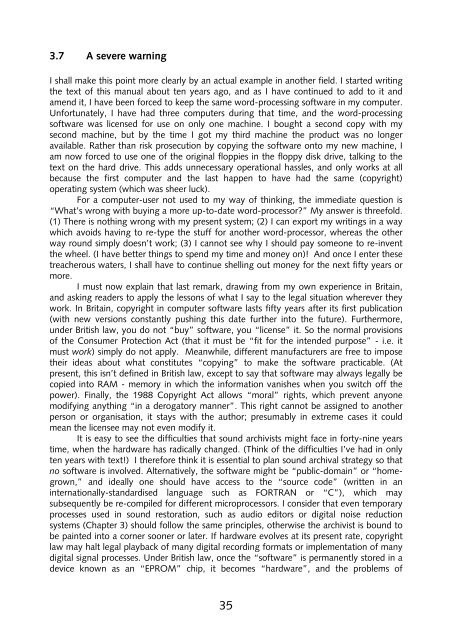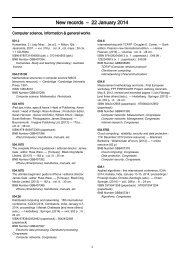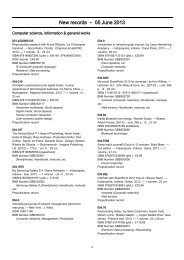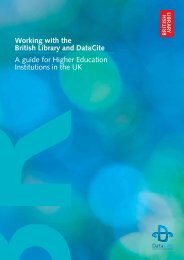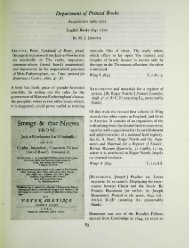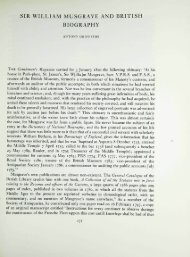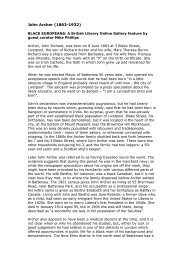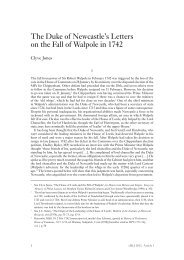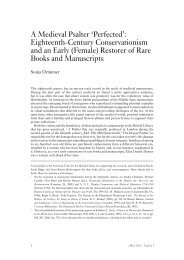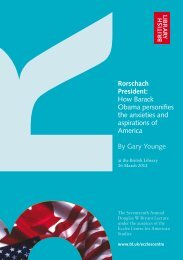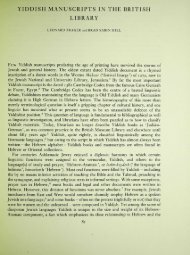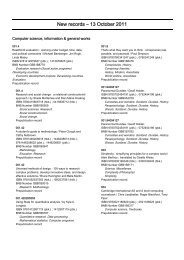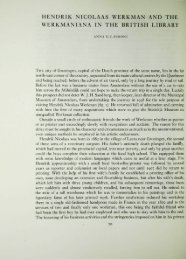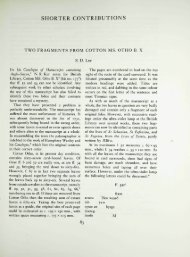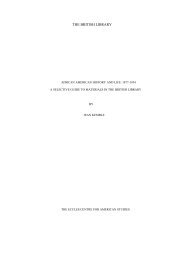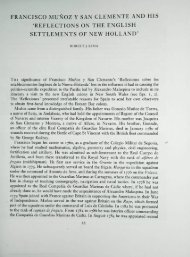MANUAL OF ANALOGUE SOUND RESTORATION ... - British Library
MANUAL OF ANALOGUE SOUND RESTORATION ... - British Library
MANUAL OF ANALOGUE SOUND RESTORATION ... - British Library
Create successful ePaper yourself
Turn your PDF publications into a flip-book with our unique Google optimized e-Paper software.
3.7 A severe warning<br />
I shall make this point more clearly by an actual example in another field. I started writing<br />
the text of this manual about ten years ago, and as I have continued to add to it and<br />
amend it, I have been forced to keep the same word-processing software in my computer.<br />
Unfortunately, I have had three computers during that time, and the word-processing<br />
software was licensed for use on only one machine. I bought a second copy with my<br />
second machine, but by the time I got my third machine the product was no longer<br />
available. Rather than risk prosecution by copying the software onto my new machine, I<br />
am now forced to use one of the original floppies in the floppy disk drive, talking to the<br />
text on the hard drive. This adds unnecessary operational hassles, and only works at all<br />
because the first computer and the last happen to have had the same (copyright)<br />
operating system (which was sheer luck).<br />
For a computer-user not used to my way of thinking, the immediate question is<br />
“What’s wrong with buying a more up-to-date word-processor?” My answer is threefold.<br />
(1) There is nothing wrong with my present system; (2) I can export my writings in a way<br />
which avoids having to re-type the stuff for another word-processor, whereas the other<br />
way round simply doesn’t work; (3) I cannot see why I should pay someone to re-invent<br />
the wheel. (I have better things to spend my time and money on)! And once I enter these<br />
treacherous waters, I shall have to continue shelling out money for the next fifty years or<br />
more.<br />
I must now explain that last remark, drawing from my own experience in Britain,<br />
and asking readers to apply the lessons of what I say to the legal situation wherever they<br />
work. In Britain, copyright in computer software lasts fifty years after its first publication<br />
(with new versions constantly pushing this date further into the future). Furthermore,<br />
under <strong>British</strong> law, you do not “buy” software, you “license” it. So the normal provisions<br />
of the Consumer Protection Act (that it must be “fit for the intended purpose” - i.e. it<br />
must work) simply do not apply. Meanwhile, different manufacturers are free to impose<br />
their ideas about what constitutes “copying” to make the software practicable. (At<br />
present, this isn’t defined in <strong>British</strong> law, except to say that software may always legally be<br />
copied into RAM - memory in which the information vanishes when you switch off the<br />
power). Finally, the 1988 Copyright Act allows “moral” rights, which prevent anyone<br />
modifying anything “in a derogatory manner”. This right cannot be assigned to another<br />
person or organisation, it stays with the author; presumably in extreme cases it could<br />
mean the licensee may not even modify it.<br />
It is easy to see the difficulties that sound archivists might face in forty-nine years<br />
time, when the hardware has radically changed. (Think of the difficulties I’ve had in only<br />
ten years with text!) I therefore think it is essential to plan sound archival strategy so that<br />
no software is involved. Alternatively, the software might be “public-domain” or “homegrown,”<br />
and ideally one should have access to the “source code” (written in an<br />
internationally-standardised language such as FORTRAN or “C”), which may<br />
subsequently be re-compiled for different microprocessors. I consider that even temporary<br />
processes used in sound restoration, such as audio editors or digital noise reduction<br />
systems (Chapter 3) should follow the same principles, otherwise the archivist is bound to<br />
be painted into a corner sooner or later. If hardware evolves at its present rate, copyright<br />
law may halt legal playback of many digital recording formats or implementation of many<br />
digital signal processes. Under <strong>British</strong> law, once the “software” is permanently stored in a<br />
device known as an “EPROM” chip, it becomes “hardware”, and the problems of<br />
35


